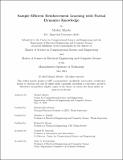Sample Efficient Reinforcement Learning with Partial Dynamics Knowledge
Author(s)
Alharbi, Meshal
DownloadThesis PDF (1.840Mb)
Advisor
Roozbehani, Mardavij
Dahleh, Munther A.
Terms of use
Metadata
Show full item recordAbstract
The problem of sample complexity of online reinforcement learning is often studied in the literature without taking into account any partial knowledge about the system dynamics that could potentially accelerate the learning process. In this thesis, we study the sample complexity of online Q-learning methods when some prior knowledge about the dynamics is available or can be learned efficiently. We focus on systems that evolve according to an additive disturbance model where the underlying dynamics are described by a deterministic function of states and actions, along with an unknown additive disturbance that is independent of states and actions. In the setting of finite Markov decision processes, we present an optimistic Q-learning algorithm that achieves Õ(√T) regret without polynomial dependency on the number of states and actions under perfect knowledge of the dynamics function. This is in contrast to the typical Õ(√SAT) regret for existing Q-learning methods. Further, if only a noisy estimate of the dynamics function is available, our method can learn an approximately optimal policy in a number of samples that is independent of the cardinalities of state and action spaces. The sub-optimality gap depends on the approximation error of the noisy estimate, as well as the Lipschitz constant of the corresponding optimal value function. Our approach does not require modeling of the transition probabilities and enjoys the same memory complexity as model-free methods.
Date issued
2024-05Department
Massachusetts Institute of Technology. Department of Electrical Engineering and Computer Science; Massachusetts Institute of Technology. Center for Computational Science and EngineeringPublisher
Massachusetts Institute of Technology